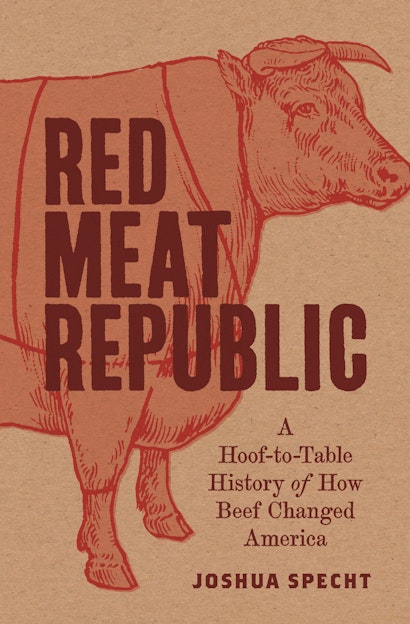By the late nineteenth century, Americans rich and poor had come to expect high-quality fresh beef with almost every meal. Beef production in the United States had gone from small-scale, localized operations to a highly centralized industry spanning the country, with cattle bred on ranches in the rural West, slaughtered in Chicago, and consumed in the nation’s rapidly growing cities. Red Meat Republic tells the remarkable story of the violent conflict over who would reap the benefits of this new industry and who would bear its heavy costs.
Joshua Specht puts people at the heart of his story—the big cattle ranchers who helped to drive the nation’s westward expansion, the meatpackers who created a radically new kind of industrialized slaughterhouse, and the stockyard workers who were subjected to the shocking and unsanitary conditions described by Upton Sinclair in his novel The Jungle. Specht brings to life a turbulent era marked by Indian wars, Chicago labor unrest, and food riots in the streets of New York. He shows how the enduring success of the cattle-beef complex—centralized, low cost, and meatpacker dominated—was a consequence of the meatpackers’ ability to make their interests overlap with those of a hungry public, while the interests of struggling ranchers, desperate workers, and bankrupt butchers took a backseat. America—and the American table—would never be the same again.
A compelling and unfailingly enjoyable read, Red Meat Republic reveals the complex history of exploitation and innovation behind the food we consume today.
Awards and Recognition
- Winner of the Theodore Saloutos Memorial Award, Agricultural History Society
- Honorable Mention for the Vincent P. DeSantis Book Prize, Society for Historians of the Gilded Age and Progressive Era
- Co-Winner of the Silver Medal in Business Commentary, Axiom Business Book Awards
- One Smithsonian's Ten Best Books av������ Food of 2019
Joshua Specht is assistant professor of history at the University of Notre Dame. Twitter @joshspecht
"Specht’s story of how the meatpackers exploited unskilled labour, bankrupted local butchers and seized power from the railroads holds warnings for today."—Brooke Masters, Financial Times
"Explaining how Americans came to eat so much beef and to pay so little for it turns out to be an especially gargantuan enterprise, which Specht pulls off with aplomb, in accessible and sprightly prose."—Samuel Moyn, New Republic
"A fascinating cultural exploration."—Rebecca Onion, History Today
"Specht tells the little-known story of how Americans became beef-eaters. From cattle ranches in the rural West to slaughterhouses in Chicago, the environmental and business historian charts the path of meat and, in doing so, delivers what is really a tale of people and power. . . . By following the meat industry through centuries of conflict, this book puts a new, troubling lens on American history."—Andrea Michelson, Smithsonian
"In a signal contribution to a growing scholarship on the history of food, Specht's Red Meat Republic carefully traces the emergence of the modern beef industry, following the story from cow path to slaughterhouse. A troubling, fascinating read."—Jill Lepore, author of These Truths: A History of the United States
"This book reveals how Americans became beef eaters, and it is not a story you know. Joshua Specht shows how this dramatic change in America's diet was grounded in a history of violence and social struggle, one that saw meatpackers prevailing over ranchers and butchers and becoming the feeders of the rapidly expanding republic."—Pekka Hämäläinen, author of The Comanche Empire
“Specht’s evocation of specific places—from the plains and the varied sites of industrial labor to the shops where meat was bought and the tables at which it was eaten—persuasively grounds his story in American culture. This is an impressive and compelling book.”—Harriet Ritvo, author of Noble Cows and Hybrid Zebras: Essays on Animals and History
"Peeling the plastic wrap off the cut, Specht uncovers the political economy of modern meat, from violent dispossession to high-stakes struggles over labor and profits."—Kristin L. Hoganson, author of The Heartland: An American History
“Specht’s wonderful and impressive research covers an enormous territory. Red Meat Republic will reshape historians’ approach to this important topic.”—John Mack Faragher, author of Eternity Street: Violence and Justice in Frontier Los Angeles

